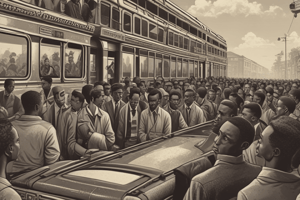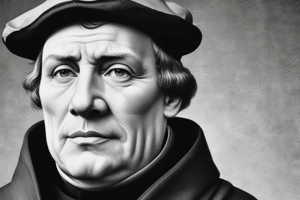Podcast
Questions and Answers
What was the goal of the Freedom Riders?
What was the goal of the Freedom Riders?
- To promote segregation on interstate buses
- To gain support from white supremacists
- To challenge segregation laws in the Deep South (correct)
- To start a national movement against communism
What was the Supreme Court's ruling on Black rights?
What was the Supreme Court's ruling on Black rights?
- Black people had the same rights as white people
- Black people had the right to vote but not to travel
- Black people had no rights that white people had to respect (correct)
- Black people had fewer rights than white people
What was the purpose of the Freedom Rides?
What was the purpose of the Freedom Rides?
- To promote segregation on interstate buses in the South
- To challenge segregation on interstate buses in the South (correct)
- To start a national movement against communism
- To travel in small groups on commercial buses
Who organized the Freedom Rides?
Who organized the Freedom Rides?
What was Martin Luther King Jr.'s position on the Freedom Rides?
What was Martin Luther King Jr.'s position on the Freedom Rides?
What did the Kennedys focus on initially?
What did the Kennedys focus on initially?
What was the attitude of the Birmingham police department towards the Freedom Riders?
What was the attitude of the Birmingham police department towards the Freedom Riders?
Who led the new group of Freedom Riders after the first group was unable to continue?
Who led the new group of Freedom Riders after the first group was unable to continue?
What was the Freedom Riders' approach to opposition and violence?
What was the Freedom Riders' approach to opposition and violence?
What was the impact of the Freedom Rides on the civil rights movement?
What was the impact of the Freedom Rides on the civil rights movement?
Flashcards
Freedom Riders
Freedom Riders
Civil rights activists who challenged segregation in the Southern U.S. in 1961.
Segregation
Segregation
The separation of people based on race or ethnicity.
Civil Rights Movement
Civil Rights Movement
A social movement demanding equal rights for all people.
Nonviolent protest
Nonviolent protest
Signup and view all the flashcards
Interstate buses
Interstate buses
Signup and view all the flashcards
Violence against Freedom Riders
Violence against Freedom Riders
Signup and view all the flashcards
Congress of Racial Equality (CORE)
Congress of Racial Equality (CORE)
Signup and view all the flashcards
Supreme Court rulings
Supreme Court rulings
Signup and view all the flashcards
National Attention
National Attention
Signup and view all the flashcards
Birmingham Police Department
Birmingham Police Department
Signup and view all the flashcards
Study Notes
- The Freedom Riders were a group of civil rights activists who challenged segregation laws in the Deep South in 1961.
- They traveled in small groups on commercial buses, deliberately violating segregation laws.
- The goal was to start a national movement and get the movement into the Deep South.
- The Supreme Court had ruled that there was no right that a Black person had that white people had to respect.
- Travel in the segregated South was humiliating for Black people, and separate facilities were meant to show that Blacks were inferior.
- The Kennedys were not initially focused on civil rights, but rather on the Soviet Union and the cold war.
- The civil rights leaders needed to do something dramatic to get the Kennedys' attention, which led to the idea of the Freedom Rides.
- The idea of the Freedom Rides was radical and controversial within the civil rights community.
- The Freedom Rides were risky, as the activists faced night riders, hoodlums, and uncertain encounters.
- The Freedom Rides were ultimately successful in challenging segregation laws and drawing national attention to the civil rights movement.
- The Freedom Rides were a nonviolent protest against segregation on interstate buses in the South.
- The riders faced violent opposition from white supremacists and were beaten and attacked.
- The Supreme Court had ruled against segregation on interstate buses in 1946, but the ruling was not enforced in the South.
- The Freedom Rides were organized by the Congress of Racial Equality (CORE) and included both Black and white riders.
- Martin Luther King Jr. advised against the Freedom Rides, warning of the potential for violence.
- The riders were met with violence in Anniston, Alabama, where their bus was attacked and set on fire.
- The riders were also attacked in Birmingham and Montgomery, Alabama.
- Despite the violence, the Freedom Rides brought national attention to the issue of segregation on interstate buses.
- The riders' bravery and commitment to nonviolent resistance inspired others to join the civil rights movement.
- The Freedom Rides were a key moment in the civil rights movement and helped to pave the way for the Civil Rights Act of 1964.
- The Freedom Riders were a group of activists who challenged segregation laws in the South in 1961.
- They faced violent attacks from white supremacists, including being beaten and their buses being burned.
- The Birmingham police department, led by Bull Connor, made an agreement with the KKK to allow them to attack the Freedom Riders at the bus station.
- The FBI, led by J. Edgar Hoover, did nothing to protect the Freedom Riders despite knowing about the planned violence.
- The Freedom Riders continued their journey despite the violence and opposition.
- The Kennedy brothers, who were in power at the time, wanted the issue to go away and were focused on other matters.
- The violence against the Freedom Riders gained international attention and reflected poorly on the United States.
- The Freedom Riders believed that they must not surrender to violence and continued their journey.
- The bus driver refused to drive the Freedom Riders due to the threat of violence, but they eventually found another driver.
- The situation was tense and anything was possible as they continued their journey.
- Freedom Riders were attempting to desegregate public transportation in the South in 1961.
- They faced violent opposition, including beatings and bombings.
- After being beaten in Alabama, the Freedom Riders wanted to continue but were traumatized.
- They were unable to continue on the bus due to a lack of drivers.
- The group eventually decided to end the Freedom Ride.
- Some members of the movement wanted to continue and a new group was formed in Nashville.
- Diane Nash led the new group and was determined to continue the Freedom Ride despite the risks.
- The attorney general tried to convince Nash to stop the new group but she refused.
- The new group faced more violence and opposition in Birmingham.
- Despite the dangers, the Freedom Riders were committed to nonviolence and desegregation.
Studying That Suits You
Use AI to generate personalized quizzes and flashcards to suit your learning preferences.




